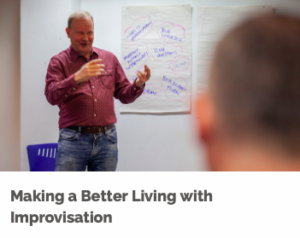Beware those classic Ted stories

Stories are great. But beware those Tedx talks that construct enticing arguments on the shakiest of foundations. The personal story draws you in, and suddenly you find yourself tempted to agree with a load of nonsense. I see many examples. Here’s one I watched recently, so you don’t need to: On Being Wrong – Kathryn Schulz.
I viewed this because I’m interested in how we get things right, how we can get things wrong less often, and how we talk about such matters.
LOOK FOR CONTRADICTIONS
In her talk, Kathryn Schultz proposes that we sometimes misunderstand the signs around us, and that this has important effects on our behaviour. As an example, she describes a US road sign for a picnic area that she misinterpreted as a Chinese symbol. It’s a funny story, and she tells it well. Then her talk falls apart.
We tend not to think about ourselves being wrong, she says – which is an immediately odd tack, as it contradicts her road sign story, when she was puzzled enough to ask her friend, suspecting that what she thought it meant was unlikely to be right.
But she claims anyway that we can’t think what we are wrong about, because we live in the present tense, feeling right. And Schulz thinks this is a problem, and that to step outside this ‘bubble’ is desirable.
Next she asserts that it doesn’t feel good to be wrong, and she presents this as if it were a universal truth. Well, sometimes, yes, to realise we are wrong can be devastating. But it can also be funny or a relief to realise our errors.
Being wrong before you know you are, feels right, she says. Again, yes in many cases, but probably less true in the more questionable areas, for example, when we are not sure or know there is controversy.
AVOID ILLOGICAL GENERALISATIONS
She says we look down on the kid who gets a poor score in schools, and generalises from this one instance to suggest that this is how we feel about anyone who gets anything wrong – missing out, for example, on how we might admire an explorer who aimed for one thing and discovered another or might venerate all the scientists who struggled before getting things right. Even the kid in school may be perceived as a rebel or a candidate for more support.
She then generalises again with no logical connection whatsoever that ‘the way to succeed in life is to never make any mistakes’. Really? How would anyone possibly think that when you know that many of your successes have followed unproblematically from processes in which you have made mistakes: those that you made by yourself when trying to learn something new, or those you made when alongside supportive friends or coaches, or those thousands of relatively trivial mistakes that are simply not pounced on because no one cares?
Now, having ‘established’ this untruth, she can say all sorts of things about it, but they are all said without foundation. For example, apparently ‘we freak out at the possibility we got something wrong’, because we are all perfectionists. Well, no we don’t. She didn’t freak out at her own road sign example. She laughed. Nor are we all perfectionists. There may be people who want to get things right in some contexts and who have more relaxed standards in others.
TO GET SOMETHING WRONG IS TO LEARN
Next she claims that we think ‘getting something wrong means there’s something wrong with us’. Maybe sometimes we do, but not at other times. Importantly, it may be right sometimes to think so – it is true we are prone to cognitive errors, for example – so we are alerted to question and to check and if something is wrong with us we can aim to correct it. And sometimes not – let’s say that I chose the wrong meal at a restaurant, as it turns out I’d have preferred yours. It would be bizarre to deduce that there’s something wrong with me. We can simply accept that I got that wrong, that I’d rather have had your meal and it may be worth remembering for the next visit. That’s an example of what we call learning.
Her surgery story, in which the surgeon operates on a patient’s wrong arm, for me highlights the need to check on important things and to have accurate systems in place. It’s a good example of how in many circumstances, we don’t want to be supportive or relaxed about making mistakes. It’s a good setting for appropriate perfectionism. Our feelings alone are unreliable (Schulz claims and we can all agree), so we don’t stop entertaining the possibility that we could be wrong.
Her next section is about ‘idiots who don’t agree with us’, but it applies only when we mistakenly think we are right. It’s not a bad analysis of what’s going on when we actually are right – which may be most of the time about most things, near enough. Far from being the major problem that KS implies, it’s a reasonable way for scientists to think about climate deniers, astronomers to argue with astrologers, doctors to challenge homeopaths, in their fields of expertise where there’s evidence versus absence of evidence.
DON’T LET AN APPEALING STORY FOOL YOU
I stopped watching about 11 minutes in, as there are better things to do with our time than indulge speakers who make a range of claims, some sensible and some absurd, tied loosely together by an appealing story. Many of us are quite happy to question things and not assume we’re always right. That’s the point of thinking about things, about debate and about learning.
To find out more about our story-telling courses and how they can help you articulate the messages that matter, please give us a call.
Paul Jackson Associates Limited. A registered company in England and Wales. Company Number 09564618. VAT Number GB 213 379812. Registered Address 10 Greville House, Lower Road, Harrow on the Hill, Middlesex, HA2 0HB. Postal Address 34a Clarence Road, St Albans, Hertfordshire, AL1 4NG Telephone 01727 843 820 Mobile 07973 953 586
© 2009-2018 Paul Jackson Associates / The Improvisation Academy - All Rights Reserved
Paul Jackson Associates Limited. A registered company in England and Wales. Company Number 09564618. VAT Number GB 213 379812. Registered Address 10 Greville House, Lower Road, Harrow on the Hill, Middlesex, HA2 0HB. Postal Address 34a Clarence Road, St Albans, Hertfordshire, AL1 4NG Telephone 01727 843 820 Mobile 07973 953 586
© 2009-2017 Paul Jackson Associates / The Improvisation Academy – All Rights Reserved



